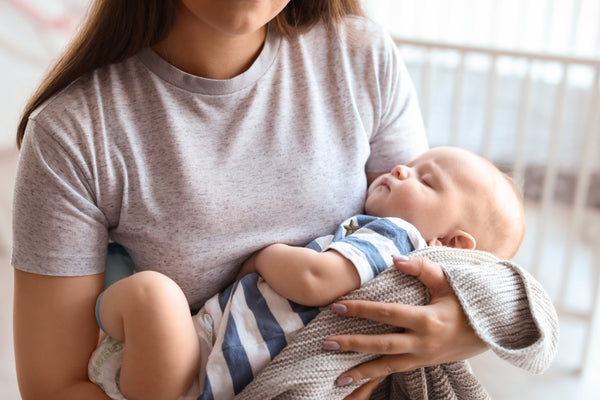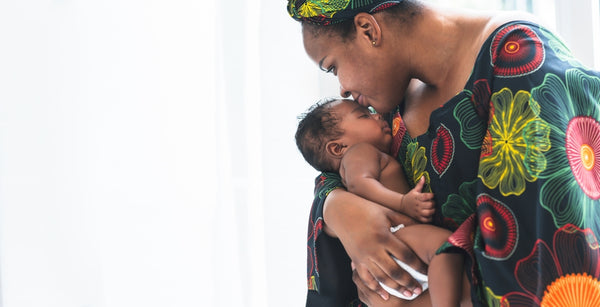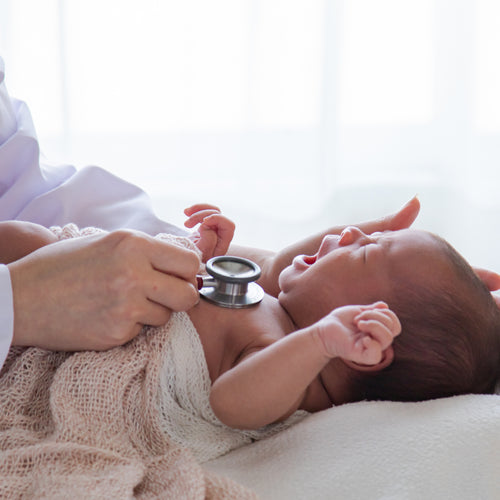Note: Always see a healthcare professional if you have concerns about your child’s health.
Dealing with a sick baby can be difficult, especially if this is your first. They can’t tell you what’s wrong, and worry can leave us unsure of the best course of action. Seeing your healthcare professional is the first port of call for serious issues, but once that’s done, there are other things that may help calm a baby who is under the weather.
Hydration
Important at the best of times, hydration is even more vital when our little ones are sick. For babies who are still being exclusively breastfed, offering them frequent feeds will keep them hydrated. For older children and babies who are bottle-fed, offer bottles or cups of water. A good sign is if their intake is normal and they are still producing the usual number of wet nappies. If, however, they are refusing feeds and drinks, going to the doctor, even if you have already been, is essential, as dehydration can affect babies much more quickly than it does adults.
Keep the Environment Calm and Comfortable
Just like us, a noisy, bright, overstimulating environment can leave sick babies distressed and unable to settle. Dim the lights, keep loud sounds to a minimum, and make sure the temperature is comfortable. Depending where you are in the world, humidity levels that are too high or too low can also lead to extra crankiness, so investing in a dehumidifier or humidifier for your home can be useful, especially if they’re congested.

Be Gentle
It’s not uncommon for sick babies to become sensitive to touch, so being even more gentle than normal when handling them can help settle them. That said, sick children are frequently clingy, so they may need more cuddles than usual. Being careful, holding them close, and gently rocking them can help with settling. Being close to you, feeling your body’s warmth, and hearing your breathing and heartbeat all go a long way to helping ill babies feel safe, snug and secure.
Use a Nasal Aspirator
One of the worst things about a baby being sick is a congested nose. It makes it hard for them to breathe and harder still to feed – they need a clear nose while latched on to be able to breathe and feed effectively. Haakaa has several options to help you clear your little one’s nose: the Electric Baby Nasal Aspirator, the Silicone Penguin Nasal Aspirator, and the Easy-Squeezy Silicone Bulb Syringe. Each of these performs its job in slightly different ways. The Electric Aspirator is, of course, electric, while the Penguin Aspirator and the Easy-Squeezy Bulb Syringe are both manual. The difference between the manual versions? The Penguin one features a handy dual-valve design, letting you quickly and cleanly clear your little one’s nose without worrying about backflow!
Monitor Their Temperature
It’s essential to keep an eye on your baby’s temperature. While fever is a normal part of the body’s response to sickness, it can be more dangerous in our very little ones. In fact, if your baby is younger than three months, Plunket1 recommend taking them to the doctor with any sign of fever – there is no set temperature to reach. If you don’t have access to a thermometer, you can still check if they are hotter than usual by putting your fingers between their shoulder blades (under their clothes), and if they feel hotter than usual, take them to get checked out. For older children, a temperature of around 38°C is a mild fever, and anything over 39°C is high. If you are ever worried, however, it’s always better to err on the side of caution and get them checked.
Trust your instincts
You’re with your baby every day, and you know if something isn’t right. Trust yourself, and if you think they need to see a doctor – take them. It’s always far better to go unnecessarily than the other way around, and you’re the one who is in the best position to know if something needs to be looked at.

Look After Yourself
It seems a common refrain, but it can never be overstated – you put yourself in the best position to care for your child if you are doing well yourself. Sick babies can be an even greater strain on parents than usual, so taking care of yourself is crucial. Eat well, keep hydrated, get rest, and utilise the support networks around you. As with every other aspect of parenthood, you absolutely do not have to do it alone. There are also helplines you can contact – in New Zealand, PlunketLine (0800 933 922) and Healthline (0800 611 116) are both available 24/7 should you have any questions at all about you or your family’s health. Note: PlunketLine is for advice related to children under five years of age – for older children and adults, Healthline should be your first port of call.
Each baby is different, and so are their families. As with everything, what works in one situation won’t be appropriate for another. Make sure you consult your doctor or other medical professionals to get advice that will work for you and your baby, taking into consideration the specific circumstances you’re in. If you find you can’t get to a doctor, things like the helplines above can be a great first step – check to see if your country has something similar. Knowing it before you need it makes life a little bit easier.
Sources:
1Fever. (n.d.). Plunket New Zealand. https://www.plunket.org.nz/child-health-concerns-and-symptoms/coughs-colds-breathing-and-fevers/fever-high-temperature/
This blog does not constitute medical advice and should not be taken as such. Please consult a medical professional if you have any concerns about your child’s health or development.

